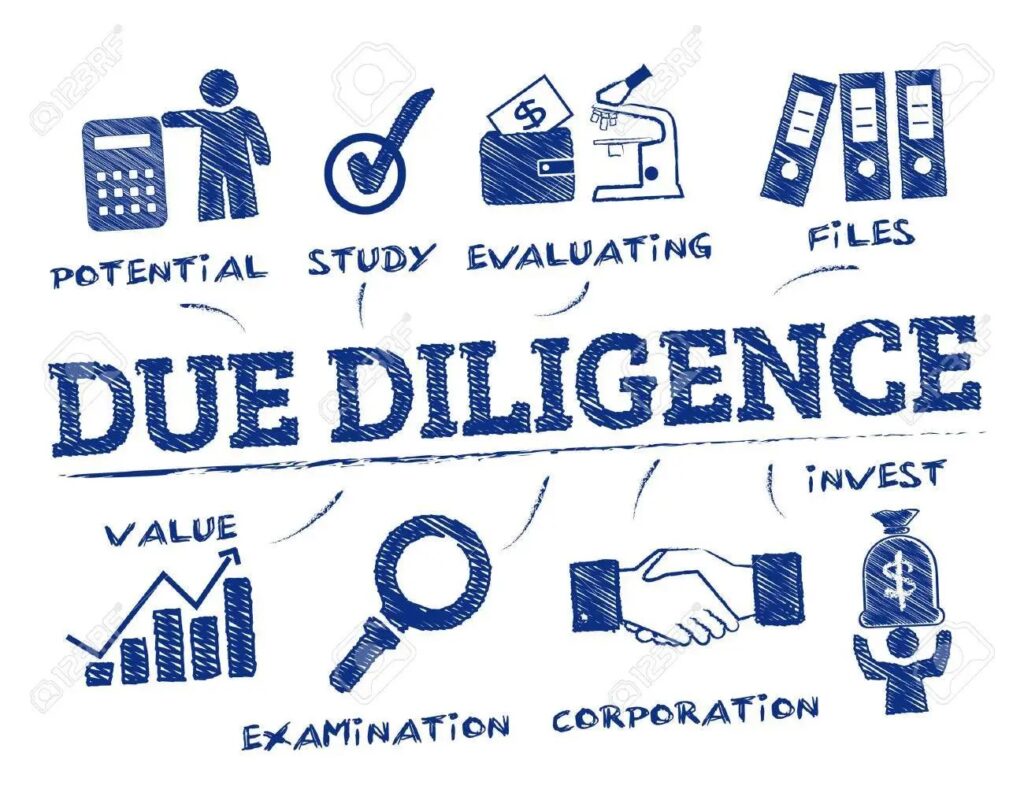In simple words, due diligence refers to a detailed scrutiny of a firm or startup interested in securing funding from angel investors. It involves a series of inspections that angels will perform on a startup to verify each fact that the startup has mentioned in its pitch deck.
Before signing any agreement or deal between both parties—the angel investor and the startup founder—the formal completion of the due diligence process is recommended.
Angel investors shouldn’t make any investment in a startup without going through the due diligence process. Once it’s completed, the angel investor can stay up to date about crucial financial details, including the firm’s past performance, revenue generated in the previous quarters, information related to legal disputes, if any and much more.
Due diligence helps the angel investor know about the startup firm’s capitalization, revenue, valuations, competitors’ analysis, management process, and risks involved in the project. It may take up to two to three weeks to complete a due diligence process.
If you’re an angel investor and want to invest in startups, get regsitered on Startup Steroid. We’re a leading deal flow platform where you can create a team of financial experts who can securely perform due diligence on startups in a controlled environment while sharing essential document with you on the platform itself.
In this blog, we’ll deep dive into the essential aspects of due diligence and what it looks like! We’ll provide you with all necessary information that you should know before investing in a startup.
If the due diligence process is completed and no red flag is found, it means the firm is good for investment. Some of the key documents scrutinized during the process are capitalization table balance sheets, income statements, business plans, and financial statements. The firm’s long-term and short-term liabilities and assets are also considered.
Types of Due Diligence:
-
Pre-Term Sheet Due Diligence
It is also called business due diligence. Under this process, the angel investor or the firm conducting the due diligence determines whether a particular startup is the right choice for the investment or not.
The due diligence process starts immediately after the investor expresses their desire to invest in a startup. An investor analyses the startup’s financial details and performance while predicting its future cash needs. On average, Pre-term sheet due diligence takes over a couple of weeks to complete.
-
Post-Term Sheet Due Diligence
As the name indicates, post-term sheet due diligence takes place after the pre-term process gets over. In this stage of due diligence, each claim made by the startup will be verified before finalizing the deal.
It’s largely a formal process and key documents are signed in the presence of both parties—angel investor and startup founder along with their legal and finance teams.
What Actually Happens During Due Diligence?
The process of due diligence can be divided into two categories: collection of data and analysis of data.
The collection of data, also called information gathering forms the critical aspect of due diligence. Here, the angel investor tries to gather all relevant information about a startup relating to its financial position, legal status, and business process.
Financial information can be verified using key documents like income statements, balance sheets, and cash flow statements. The investor will take a look at your tax records as well. Besides financial information, the investor will also scrutinize key legal information, including business licenses, contracts, agreements, and details about pending lawsuits, if any.
After legal and financial information, the investor would finally check your startup business model and analyze its demand with a futuristic perspective.
The investor may personally talk to the startup founder and its management team to understand what the startup wants to achieve as its long-term goal.
How Is the Information Collected
The angel investor or the firm conducting the due diligence uses multiple ways to gather the necessary information. It involves direct interaction with the customers through which the investor wants to know if the customers are satisfied with the startup’s products or services or if they have any feedback or concerns.
The firm conducting the due diligence may also chat with the startup’s key team members to know more about its mission, vision, and future.
Some other detailed analyses that the firm may make include financial review, competitive analysis, legal diligence, and product scrutiny.
Some of the red flags that investors need to watch out for is issue relating to the startup’s IP (Intellectual Property) status, tax evasion (if any or pending cases on it), legal disputes, bad debts, and inadequate financial management.
What Happens Next After Due Diligence?
Once the due diligence process is over, it depends upon the investor whether they wish to invest in the particular firm or not.
If things don’t work out, the investor will simply back off sending a message of regret informing the startup that the latter couldn’t get shortlisted for funding.
On the other hand, the investor will send a congratulatory email to the startup founder saying their investment proposal has been accepted.
Soon, the investor will enter into a formal contract with the firm and sign an investment document clearly mentioning the amount of money they wish to keep invested in the firm.
The document will also mention key rights and duties that’ll vest with both parties, besides explaining the equity stake that’ll be taken by the investor for the amount of investment they wish to invest in the firm.
In Conclusion
The term due diligence has its origin in the 1930s when dealers had to scrutinize securities they sold before offering them to investors for purchase. It was the minimum expected duty that dealers owed to investors.
In the context of startup funding, due diligence can be a great way to mitigate investors’ risk by diving deep into all the necessary information relating to the startup.
Through due diligence, all relevant information relating to the startup can be obtained, which helps the investor take the right call regarding whether to invest in a particular startup or not.
During the process of due diligence, if any contradiction is found in regard to what the firm mentioned in its pitch deck, an investor should back off immediately.

I’m the Co-Founder of Startup Steroid, where I help founders navigate the challenges of building a startup. From connecting with the right investors and talent to guiding marketing, legal, and MVP development, I work alongside entrepreneurs to provide practical support and clarity, helping them grow their ideas into successful, sustainable businesses.






